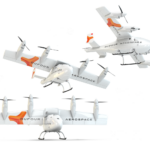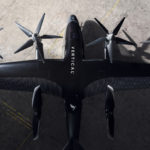Flight testing on AutoFlight’s autonomous electric vertical takeoff and landing (eVTOL) aircraft is gathering pace as the company seeks to demonstrate that the technology is no longer “science fiction”, said Mark Henning, managing director at AutoFlight Europe.
AutoFlight has been setting new benchmarks in the battery electric air-taxi landscape over the past 12 months, including the distance record of flying 250.3 km on a single battery charge.
“We’re doing the flight tests in the Greater Area of Shanghai,” said Henning at the AIRTEC aerospace fair in Augsburg, southern Germany.
“It was important to show to the world that electrical vertical takeoff and landing is not science fiction anymore. You can get a decent range with current existing technology.
“We’re now using these aircraft on a daily basis to develop and further improve our concepts and to come to a final configuration.”
AutoFlight Prosperity I models
In July, three of AutoFlight’s Prosperity I models were involved in another groundbreaking flight, when they executed a world first formation flight of three autonomous eVTOL aircraft in Shanghai.
The formation flight saw three generations of the aircraft take to the skies.
The company plans to make the prototypes into products, with a cargo version set to be released for safe cargo transport in Asia next year, and a passenger version gradually developed in the coming years.
The company, with dual headquarters in Augsburg and Shanghai, previously achieved a world record flight in February 2023 where one of their prototypes covered 250 km on a single battery charge, demonstrating the potential for sustainability in the sector.
AutoFlight recently entered into a contract with EVFLY that will see EVFLY initially purchase 205 Prosperity I and Prosperity Cargo Aircraft.
EVFLY will operate the first 10 AutoFlight Cargo aircraft in the Middle East, with subsequent deployments in Asia and Africa.
Subscribe to the FINN weekly newsletter
You may also be interested in:
Dufour Aerospace’s Aero2 aims to be ‘Swiss Army Knife of drones’

